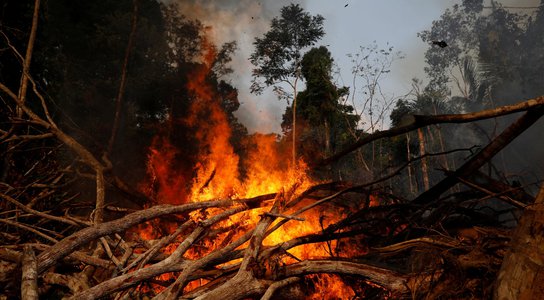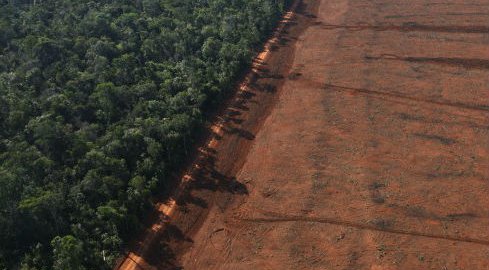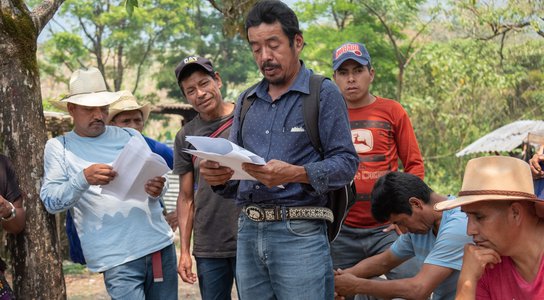New results from the Federal Prosecutor’s Office in the Amazonian state of Pará suggest major meatpackers like JBS and Minerva could be doing more to curb destructive deforestation in the Amazon.
- This year is set to be one of the worst years of Amazon deforestation since the record low of 2012, likely to reach an area equivalent to 800,000 football fields, with the cattle sector a leading driver of this forest destruction – impacting also on millions of people, homes and livelihoods.
- In light of the results, environmental NGO Global Witness calls on companies like JBS and Minerva to do more to free their supply chains of deforestation, for their international financiers like Deutsche Bank and Bank of America to take immediate action, and for governments to better regulate investments like these using mandatory due diligence.
Tuesday 12th November 2019 – Today in the Brazilian state of Pará, new data from the region’s Federal public prosecutor suggests how many meatpackers driving the region’s cattle trade continue to be linked to the destruction of the Brazilian Amazon. While international NGO Global Witness has welcomed the prosecutor’s efforts in monitoring the situation, they say it only presents part of the picture.
In Belém this morning, the public prosecutor highlighted how some improvements by major meatpackers like JBS and Minerva were made, but that the road to stopping their contribution to the accelerating destruction of the Amazon still has some way to go.
Anti-corruption and environmental NGO Global Witness flagged how critical it was that the results weren’t over stated, and that it is vital that both companies – who have long been exposed by Brazilian civil society for failing on their zero deforestation pledges – are not let off the hook.
They also called out international banks and investors for failing to do adequate due diligence, which has led to an ongoing stream of money flowing into companies like JBS and Minerva, as well as their key competitor Marfrig – despite their persistent inability to deliver on their zero deforestation commitments.
They raised the critical impact on people as well as planet from this deforestation: with forest communities living in the Amazon affected by its continued destruction. Land and environmental defenders have long been highlighting their stories from the Amazon – and how its protection is crucial for indigenous communities that depend on it, for forests and for the climate.
Mariana Abreu, Investigator at Global Witness said:
“Meatpackers like JBS and Minerva will be eager to tell you how these audits highlight their improved performance - but these new stats only tell part of the story when it comes to the destruction of the Amazon. We now need clear assurances from these companies – who have long been exposed by Brazilian civil society for failing on their zero deforestation pledges – that they are taking further and much more wide-reaching action to remove deforestation from their supply chains.
“We can’t expect the Pará prosecutor to bear the full burden of exposing this problem. As long as global banks and investors financing these companies turn a blind eye, the meatpackers will get the message loud and clear that no-one’s going to look too closely at the gap between their zero deforestation commitments, and what they do day-to-day as they buy cattle in the Amazon region.
“In fact, despite evidence that they do not adequately keep track of their supply chains and therefore are unable to prove these are deforestation free, JBS and Minerva continue to be supported by famous names in finance, including Black Rock, Deutsche Bank and Bank of America, who fail to ask enough questions about their exposure to deforestation.”
The NGO flagged how the results, while a step in the right direction, only looked at a little over half of the biggest ranchers directly supplying to JBS and Minerva. They argued how there are still far too many places where deforestation isn't even being put on the map, such as in the cases of indirect suppliers, where animals pass through numerous ranches before arriving at the meatpacker’s plants for slaughter.
Global Witness said that auditors don't even look at the most vulnerable parts of the supply chain and therefore there’s no credible way meatpackers like JBS and Minerva can say their supply chain is deforestation free.
The results follow revelations by Global Witness in its report Money to Burn that some of the largest names in global finance – Barclays, Deutsche Bank, HSBC, Santander and Standard Chartered among them—provided tens of billions of dollars in financing between 2013 and 2019 to companies either directly or indirectly deforesting the largest rainforests in the world.
Abreu said: “The answer to this? The institutions allowing money to be pumped into companies like JBS and Minerva must take responsibility, and international governments must hold them to account with stronger regulation like mandatory due diligence. This is key if we are to stop the accelerating destruction of the Brazilian Amazon, our climate and harm to communities living within and from this crucial forest.”
/ ENDS
Contacts
Notes to editor:
- Interviews in English and Portuguese on different time zones are available on request. Please contact [email protected] to arrange interviews in English, and [email protected] to arrange interviews in Portuguese.
- More details on land and environmental defenders attacked in the Amazon also available on request. Please contact [email protected].
- The full report ‘Money to Burn’ which looks at which international financial institutions are funding forest destruction can be found here.
- Detailed recommendations include:
- Key governmental and private sector commitments on deforestation set targets to achieve by 2020, making it a critical year for forests. All actors must seize the opportunity to renew and strengthen their efforts to tackle deforestation by committing to time-bound action plans, which are independently verifiable and publicly reported to ensure accountability for their delivery.
- Governments need to regulate the financial sector to stop the financing of, and investment in, deforestation. This regulation should include, among other possible measures, mandatory due diligence requiring investors and the financial sector to identify, prevent and mitigate environmental, social (including human rights) and governance risks and impacts.
- Regulatory approaches must also enable forest communities to uphold and defend their rights, and ensure that financial institutions are not profiting from, or handling any proceeds of, forest-related crime and related human rights abuses.
- All financiers of or investors in JBS, Marfrig and Minerva should initiate an immediate investigation into how the sourcing of cattle through indirect suppliers passed their internal due diligence processes.
- Financiers, investors and others in the financial sector need to: commit to a Deforestation and Land Grab free policy for their financing and investment. This should include a commitment to zero deforestation and zero exploitation, including respecting the principle of Free, Prior and Informed Consent of local communities for all activities affecting them and their rights.
You might also like
-
Article Money to Burn
More than 300 banks and investors back six of the world’s most harmful agribusinesses to the tune of $44bn
-
Briefing Strengthening corporate responsibility
The case for mandatory due diligence in the EU to protect people and the planet
-
Report Enemies of the State?
More than three people were murdered each week in 2018, with countless more criminalised, for defending their land and our environment.